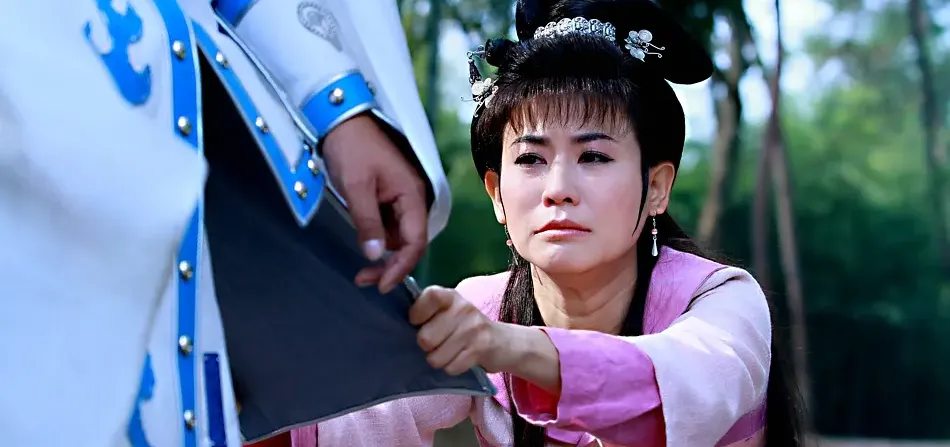“Lian’ai nao,” a Chinese slang term for irrational love, reflects modern netizens’ feelings on independence and gender roles in relationships
Love can be felt in your heart, but when it goes to your brain, you’re really in trouble—at least, according to a Chinese slang term.
Lian’ai nao, literally “love brain (恋爱脑 liàn’ài nǎo),” is a slang term netizens have been flinging around lately to describe the mindset of someone who is so madly in love that they can longer make rational decisions when it comes to the object of their infatuation or their own life.
The term has recently experienced a revival, partly due to the popularity of the TV series Fireworks of My Heart starring Yang Yang and Wang Churan. In the drama, the female protagonist’s foster parents send her abroad for her studies, help her with her career, and buy a big house for her. However, she chooses to break ties with her family for the sake of a hot-tempered male protagonist who merely cooks plain porridge for her. Suddenly, the line “he even cooked porridge for me (他给我做了粥 Tā gěi wǒ zuòle zhōu),” which Wang’s character Xu Qin used to justify why she stayed with the male lead, became the newest and most fervently debated manifestation of lian’ai nao among Chinese netizens.
Before Xu Qin, the poster child for lian’ai nao in Chinese pop culture was Wang Baochuan (王宝钏), the “ancestral grandmother of the love brain (恋爱脑祖师奶 liàn’ài nǎo zǔshīnǎi).” A character from a Chinese folk tale, Wang is a wealthy young lady who forsakes her privileged life and lives in a cave for 18 years (苦守寒窑十八年 kǔ shǒu hányáo shíbā nián), digging wild vegetables to eat (挖野菜充饥 wā yěcài chōngjī) while waiting for her lover Xue Pinggui (薛平贵) to return from war. However, it turns out Xue had married a princess while away. In one version of the legend, Xue takes Wang to the palace to be “co-wives” with his new wife, but she soon dies of sickness.
While ancient Chinese lauded Wang Baochuan’s loyalty and unwavering love, and turned the lines describing her hardships into well-known sayings about her virtue, modern netizens perceive Wang as “a perfect example of the tragic outcome of a woman’s love brain (女性恋爱脑悲惨下场的绝好范例 Nǚxìng liàn’ài nǎo bēicǎn xiàchǎng de juéhǎo fànlì).” They’ve coined new slogans and new sayings based on the tale, such as, “Even if I die in hardship, I will never let romance die (就算苦死,也要浪漫不死 Jiù suàn kǔ sǐ, yěyào làngmàn bù sǐ)”; and, “If you persist in being love-brained, you’ll end up digging wild vegetables (再恋爱脑就要去挖野菜了 Zài liàn’ài nǎo jiù yào qù wā yěcài le).”
Netizens have also compiled a list of warning signs that someone may be afflicted by lian’ai nao: If your friend declares, “He treats me well normally, he just hasn’t replied to my message in days because he’s busy with work (可是他平时对我很好啊,他只是工作太忙了,才会几天不回我的 Kěshì tā píngshí duì wǒ hěnhǎo a, tā zhǐshì gōngzuò tài máng le, cái huì jǐ tiān bù huí wǒ de)”; or, “Even if all men in the world cheat, he must be the exception (就算全世界男人都会出轨,他也一定是那个例外 Jiù suàn quán shìjiè nánren dōu huì chūguǐ, tā yě yídìng shì nàge lìwài)”; she may be suffering from an acute case.
It’s no coincidence that most people accused online of being “love-brained,” real or fictional, are female. Although the term lian’ain ao can be applied to both sexes, it usually carries a more negative connotation with females. A “love-brained” man, on the other hand, might be referred to as a “clingy little spirit (粘人精 niánrénjīng),” and self-sacrificing actions from them are described more positively as the “secret to maintaining a relationship (爱情长久的秘诀 àiqíng chángjiǔ de mìjué).” As one Weibo user expressed: “Having a love brain isn’t advisable for girls, but love-brained boys are just so adorable (女生恋爱脑不可取,但恋爱脑的男生也太太太可爱了吧 Nǚshēng liàn’ài nǎo bù kěqǔ, dàn liàn’ài nǎo de nánshēng yě tài tài tài kě’ài le ba).”
The traditional expectation on women to be a “virtuous wife and loving mother (贤妻良母 xiánqī liángmǔ),” plus a scarcity of role models for healthy relationships both in real life and in pop culture, leaves them with greater challenges to strike a balance between their romantic relationships and personal development. Even celebrities have shown that a woman might not have the power and agency to just leave when a relationship turns toxic.
However, they are also shamed online for their perceived self-sacrificing actions. The hashtag “How to rudely wake up someone with love brain (如何骂醒恋爱脑 Rúhé màxǐng liàn’ài nǎo)” has also gained popularity. Netizens suggest insulting sayings like, “When you should be studying, you go and feed the pigs (让你读书你偏去喂猪 Ràng nǐ dúshū nǐ piān qù wèi zhū),” as a way of letting love-brained individuals know that they’ve thrown away their future to “feed” their lazy, “pig-like” lovers. They also accuse those with “love brains” of being experts at deluding themselves, complaining, “His greatest charm is your imagination (他最大的魅力,就是你的想象力 Tā zuì dà de mèilì, jiùshì nǐ de xiǎngxiànglì).”
Some with love on the brain claim to be “sober lian’ai nao (清醒的恋爱脑 qīngxǐng de liàn’ài nǎo),” meaning they’re fully aware that their situation needs fixing. They lament self-deprecatingly, “I’m really not love-brained, because I am brainless in love (我真不是恋爱脑,我恋爱时没脑子 Wǒ zhēn bú shì liàn’ài nǎo, wǒ liàn’ài shí méi nǎozi), or, “When you told me you loved me, it was like an agent recruiting me into a sweatshop (你说你爱我的时候,像极了中介骗我进厂 Nǐ shuō nǐ ài wǒ de shíhou, xiàng jí le zhōngjiè piàn wǒ jìnchǎng).
Others suggest that, instead of shaming women into leaving a bad relationship, they can encourage them to recognize certain patterns of behavior, find their independence, and advocate for themselves in a more constructive way: “If you don’t get out there, you’ll think he’s your whole world (如果你不出去走走,你就会以为他就是全世界 Rúguǒ nǐ bù chūqù zǒuzǒu, nǐ jiù huì yǐwéi tā jiùshì quán shìjiè).” If only Wang Baochuan had netizens offering such good advice.












